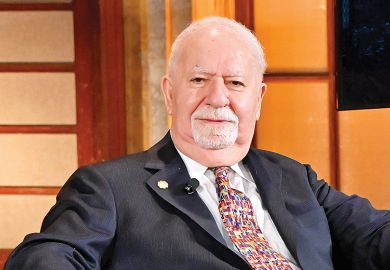A leading authority on German history, genocide and human rights has died.
Eric Weitz was born in New York in 1953 and worked summers at Camp Hurley, where left-wing songwriters helped inspire his opposition to the Vietnam War and lifelong commitment to civil rights. He studied history at SUNY Binghamton University (1974) and went on to an MA in modern European history at Boston University (1976) and further graduate studies at Ruhr University Bochum in Germany (1979-80).
For many years, Professor Weitz was unsure whether he would be able to forge an academic career and combined his studies with work as a baker and a cook. After completing a PhD at Boston University (1983), however, he secured a position at St Olaf’s College in Minnesota (1985-99) before moving on to the University of Minnesota (1999-2013), where he became a full professor and served as director of the Center for German and European Studies. He also played a central role in the creation of the Center for Holocaust and Genocide Studies.
Initially an expert on German history, Professor Weitz was the author of Creating German Communism, 1890-1990: From Popular Protests to Socialist State (1997) and a much-acclaimed study of Weimar Germany: Promise and Tragedy (2007). Yet he also ranged far more widely in books such as A Century of Genocide: Utopias of Race and Nation (2003) and A World Divided: The Global Struggle for Human Rights in the Age of Nation-States (2019). At the time of his death, he was working on a biography of Ralph Bunche, the African American scholar and diplomat who shared many of his values.
After 13 years at Minnesota, Professor Weitz became a distinguished professor of history at CUNY City College of New York. He brought with him, recalled CCNY’s current president, Vincent Boudreau, “a vision of rebuilding the humanities and arts and an insistence that academic excellence in that division, and in others that he touched, was the highest priority...His legacies at this college are many but include the collaborative establishment of the human rights programmes at City that remain vibrant to this day, and a vision for scholarship, performance, and education in the humanities and arts that is second to none.”
Professor Weitz died of cancer on 1 July and is survived by his wife, Brigitta van Rheinberg (formerly his publisher at Princeton University Press), two sons from an earlier marriage, a stepson and a granddaughter born in April.
Register to continue
Why register?
- Registration is free and only takes a moment
- Once registered, you can read 3 articles a month
- Sign up for our newsletter
Subscribe
Or subscribe for unlimited access to:
- Unlimited access to news, views, insights & reviews
- Digital editions
- Digital access to THE’s university and college rankings analysis
Already registered or a current subscriber?








